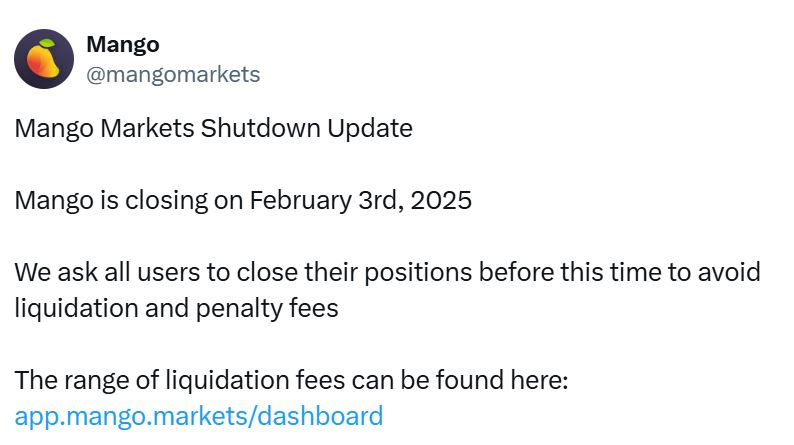US federal prosecutors are seeking a substantial prison sentence for Avraham “Avi” Eisenberg, the individual convicted of orchestrating the $110 million exploit of the decentralized exchange (DEX) Mango Markets in 2022. The recommended sentence is between 78 and 97 months (6.5 to 8 years), a significant penalty reflecting the severity of his actions.
The Case Against Eisenberg: Key Details
Eisenberg was found guilty of wire fraud, commodities fraud, and commodities manipulation in April 2024. These charges stem directly from the Mango Markets exploit, where he manipulated the price of MNGO, the platform’s native token, to drain significant funds.
Beyond the Mango Markets case, Eisenberg also faces separate charges related to the possession of child pornography, further complicating his legal situation and contributing to the prosecution’s argument for a longer sentence.
Prosecutors’ Justification for a Lengthy Sentence
Prosecutors argue that the severity of Eisenberg’s crimes warrants a significant prison term. They emphasize the following points:
- The Scale of the Fraud: The $110 million exploit had a devastating impact on Mango Markets and its users.
- Damage to Investor Confidence: Such large-scale fraud erodes trust in the cryptocurrency market.
- Need for Deterrence: A strong sentence is necessary to discourage others from engaging in similar criminal activities.
- Protection of the Public: Preventing Eisenberg from further criminal activity is a key priority.
The prosecutors stated that “Fraud that takes over $100 million from investors and effectively shuts down a business is a shocking violation of criminal law, and it necessitates a sentence commensurate with the crime.” This statement highlights the gravity of the situation from the prosecution’s perspective.
Mango Markets’ Demands for Restitution
In a separate filing, lawyers representing Mango Markets have requested the court to order Eisenberg to pay $47 million in restitution. This amount is intended to compensate all affected parties, including the Mango DAO (Decentralized Autonomous Organization), and restore them to their financial position before the exploit.
Mango Markets emphasizes that returning the misappropriated funds is crucial for rectifying the harm caused by Eisenberg’s actions. While acknowledging that the damage to their reputation is irreparable, they believe restitution is a vital step in the right direction.
The Mango Markets Exploit: A Detailed Look
The Mango Markets exploit involved a sophisticated scheme where Eisenberg artificially inflated the price of MNGO tokens. He then used this inflated value as collateral to borrow and subsequently drain funds from the platform.
Here’s a simplified breakdown:
- Price Manipulation: Eisenberg executed large buy orders of MNGO on Mango Markets, driving up the price.
- Borrowing Against Inflated Collateral: He then used the artificially inflated MNGO as collateral to borrow significant amounts of other cryptocurrencies.
- Draining the Platform: Finally, he withdrew these borrowed funds, leaving Mango Markets with a massive debt and depleted reserves.
The exploit effectively crippled Mango Markets, leading to its eventual shutdown. The platform officially ceased operations in February 2024.

Eisenberg’s Defense and the Aftermath
During his trial, Eisenberg’s legal team argued that his actions constituted a legitimate trading strategy and that he was simply exploiting a vulnerability in the Mango Markets protocol. They claimed he profited $110 million through this strategy.
Following the exploit, Eisenberg returned approximately $67 million of the stolen funds. However, he retained over $40 million after a community governance vote within the Mango DAO. The details of this vote and the reasoning behind it remain a point of contention within the crypto community.
The Wider Implications for DeFi Security
The Mango Markets exploit serves as a stark reminder of the vulnerabilities inherent in decentralized finance (DeFi) platforms. It highlights the importance of robust security audits, effective risk management, and community governance in mitigating the risk of exploits and fraud.
Here are some key takeaways for DeFi projects:
- Rigorous Security Audits: Regular audits by reputable security firms are essential to identify and address potential vulnerabilities.
- Effective Risk Management: Implement mechanisms to prevent excessive price manipulation and mitigate the impact of large-scale exploits.
- Transparent Governance: Establish clear and transparent governance processes to ensure fair and equitable decision-making.
- Bug Bounty Programs: Encourage ethical hackers to identify vulnerabilities by offering rewards for reporting bugs.
The sentencing of Avraham Eisenberg is a closely watched case that could set a precedent for future prosecutions of individuals involved in cryptocurrency exploits. It underscores the increasing scrutiny that regulators are placing on the DeFi space and the importance of adhering to legal and ethical standards.